Fountains are a lovely, eye-catching element to add to any garden or yard, but you worry that the standing water in them could attract mosquitoes. We asked experts this question, and they provided leak-proof answers.
No, garden fountains don't attract mosquitoes. Ponds and water gardens are better breeding grounds for mosquitoes or their larvae. They turn into mosquito hotbeds when neglected by homeowners.
Read on to find out why it is so and how to keep fountains, ponds, and water gardens free of mosquitoes and other irritating insects.
Are Garden Fountains A Breeding Place For Mosquitoes?
Mosquitoes love wet and marshy areas as breeding grounds, and fountains might seem the ideal place. However, it is not so!
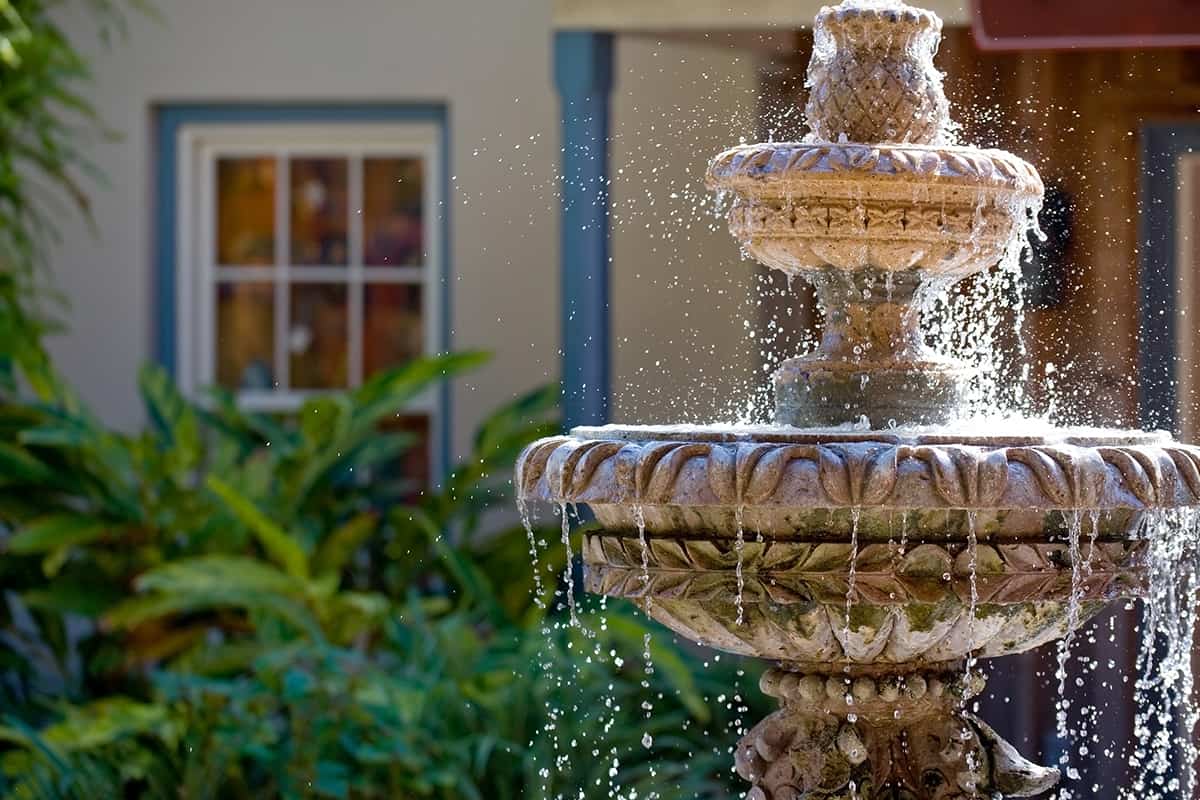
Water in fountains isn't stagnant and doesn't allow mosquito larvae to hatch on the water's surface. As long as the surface water keeps breaking, it doesn't have a film that can help incubate mosquito eggs.
Incorporate other hungry predators, such as frogs and fish, to discourage mosquitoes from laying eggs in your fountain or any other water feature in your yard. They will feast on the mosquito larvae on the water's surface, leaving them no chance of hatching.
How To Make Your Fountain Mosquito Free
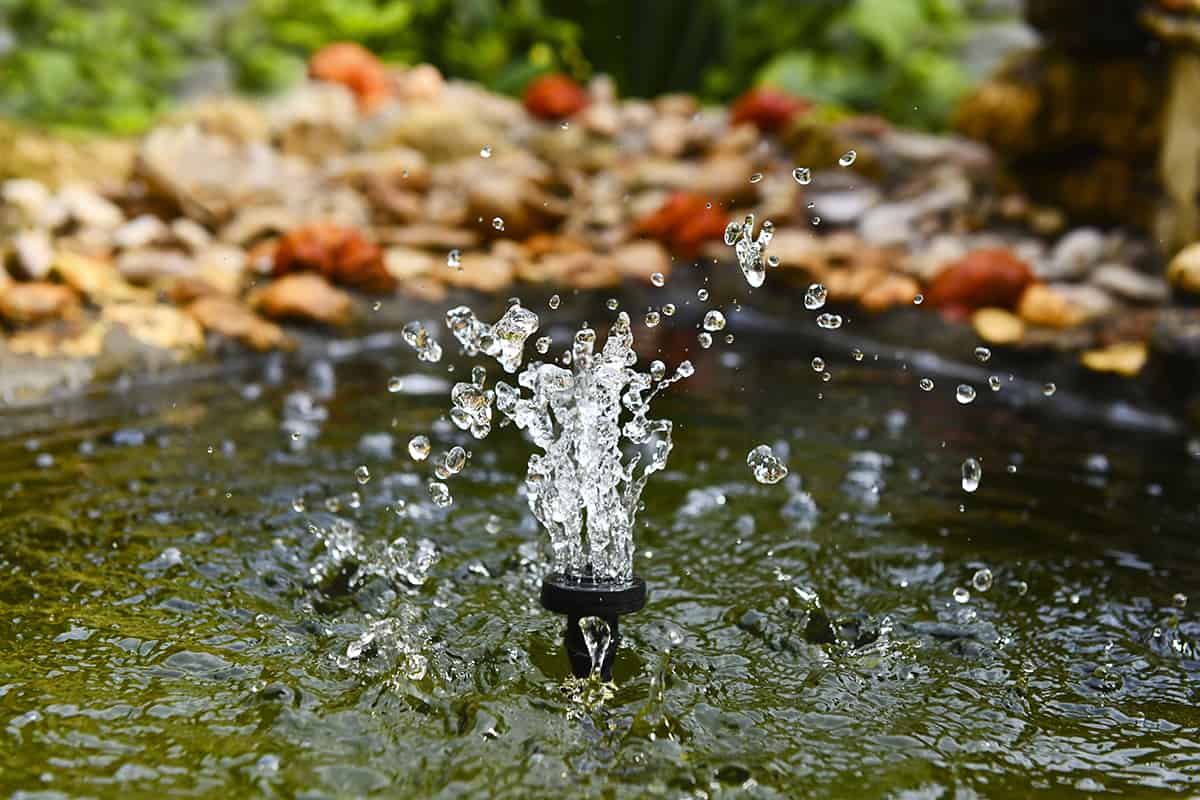
Don't be deterred from installing a fountain in your garden or backyard because of mosquitoes. There are ways to ensure that you don't turn your fountain into a breeding ground without compromising the fountain's functions.
Water Circulation
Ensure that you circulate the water in your fountain to stop mosquitoes from laying eggs. If you have a simple garden fountain without a water circulation feature, buy a water pump and install it. Install the water pump to create an elaborate waterfall if you have the time and money.
Check out this water pump on Amazon.
Constant Cleaning
Once you keep your fountain clean and fresh water, you won't have mosquitoes laying eggs there. If your fountain water isn't changed constantly, the water film on top becomes conducive for mosquitos to breed successfully.
Introduce Fish
Fish can gobble on the mosquito larvae that might be on the surface of your fountain. Look for interesting and pretty goldfish or other fish for your fountain. They will survive once you have a water pump that introduces oxygen into the water. Ensure that you have a large enough fountain for fish!
Make The Fountain Deeper And Steeper
Shallow water attracts mosquito larvae like a magnet. Thus, make your fountain deeper and ensure that it has steep walls. The steep walls provide little to no traction for any algae or larvae to hold onto.
Larvicide
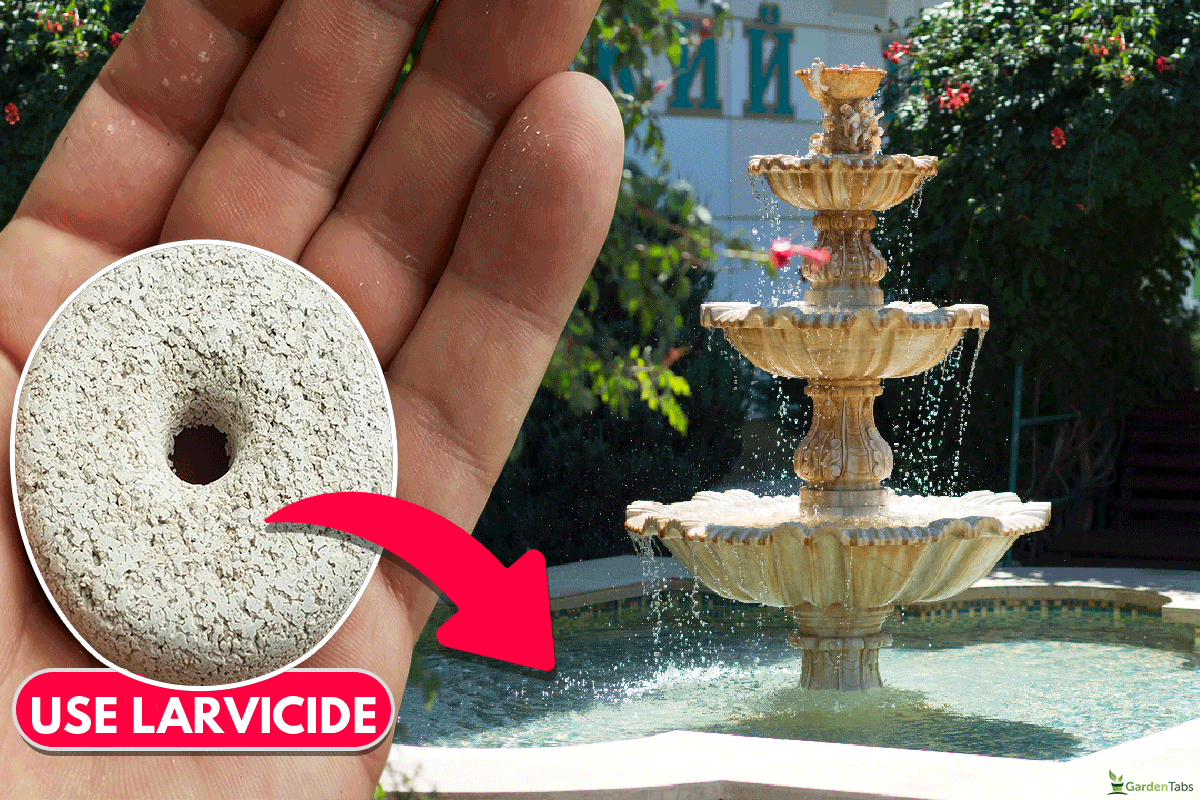
If you want your birdbath or fountain to remain presentable and clean, you might have to use a larvicide to snuff off any wiggling larvae on the water's surface. Do not use typical insecticides, as they harm water predators, such as dragonflies and backswimmers.
How To Kill Mosquitoes In Fountains?
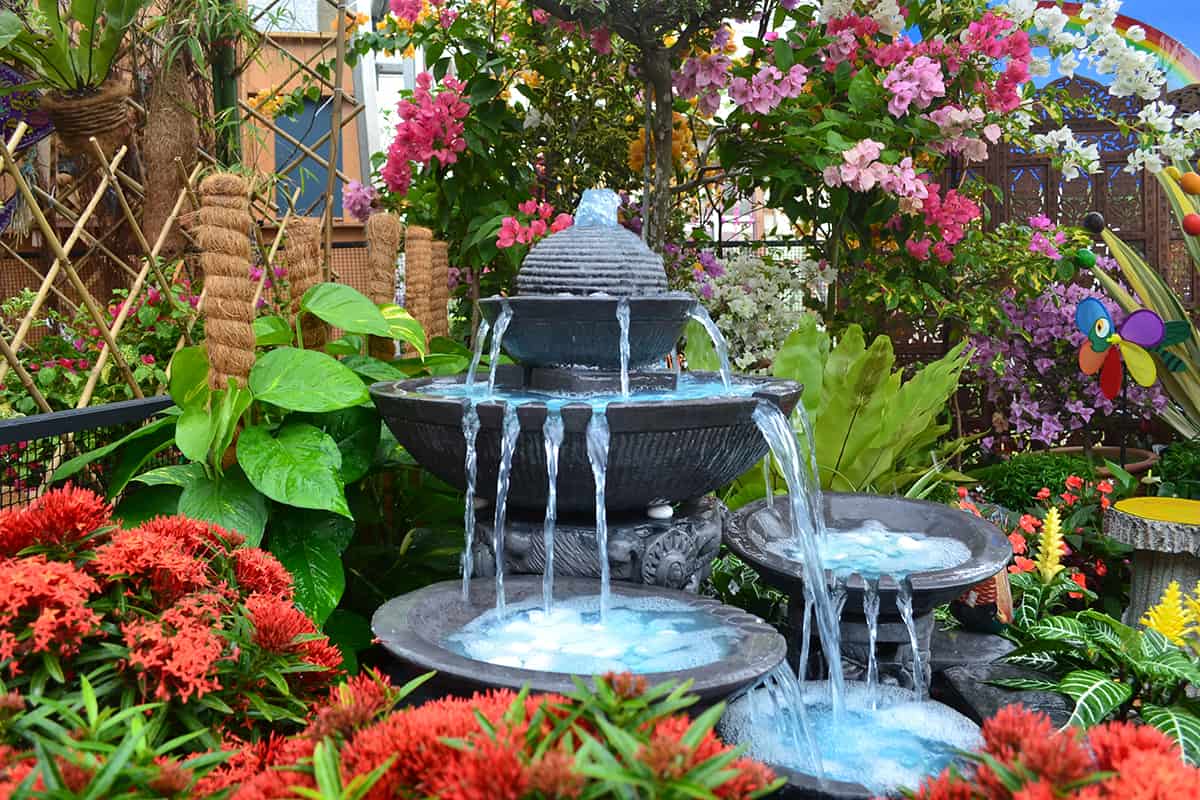
If you already own a shallow fountain and don't want to change it, you could use other alternatives to terminate any mosquito larvae.
The most common and safe methods are:
White Vinegar
The vinegar solution should be 15% vinegar and 85% water. It means you can pour the vinegar into the fountain to kill any larvae lurking on the water's surface. It is an effective and harmless solution that works almost instantaneously.
Oil
Another clean alternative is the use of oils. You can use vegetable cooking oil or cinnamon essential oil. The oils create a surface film prohibiting mosquito larvae from laying eggs or hatching. Moreso, cinnamon essential oil leaves a beautiful scent behind.
Mosquito Dunks
A chemical and yet harmless method is using mosquito dunks that contain BTI. This chemical does nothing to pets, people and insects, but this isn't the case for mosquito larvae. Once they eat it, it kills them.
Click here to buy the BTI mosquito dunks on Amazon.
Dish Soap
Any soap will work because it creates a film, and mosquitos cannot lay eggs on the water surface in your fountain. The eggs exiting eggs get suffocated and eliminate the mosquitos. However, it could harm other insects, birds, and animals in large doses.
Can Aerators Stop Mosquitoes Breeding In A Garden Fountain?
Aerators are too large for garden fountains, and water pumps do the same job. Aerators disrupt the water's surface but only work in large features such as ponds and waterfalls in your garden. They are primarily electric and have additional pipes, pumps, and connections.
Benefits Of Eliminating Mosquitoes In Your Garden Fountain
Once you eliminate the mosquitoes in your garden fountain, you will enjoy some outdoor benefits. You will be able to:
- Keep pests away, as they have nothing to feed on in your fountain.
- Reduce the risks of diseases as there is no breeding ground for any larvae.
- Keep foul smells at bay for you to enjoy fresh-smelling outdoors.
- Have an attractive outdoor feature that can be the centerpiece of your garden events.
Whether or not your water feature benefits you solely depends on how you maintain it, especially garden fountains.
Maintaining A Garden Fountain
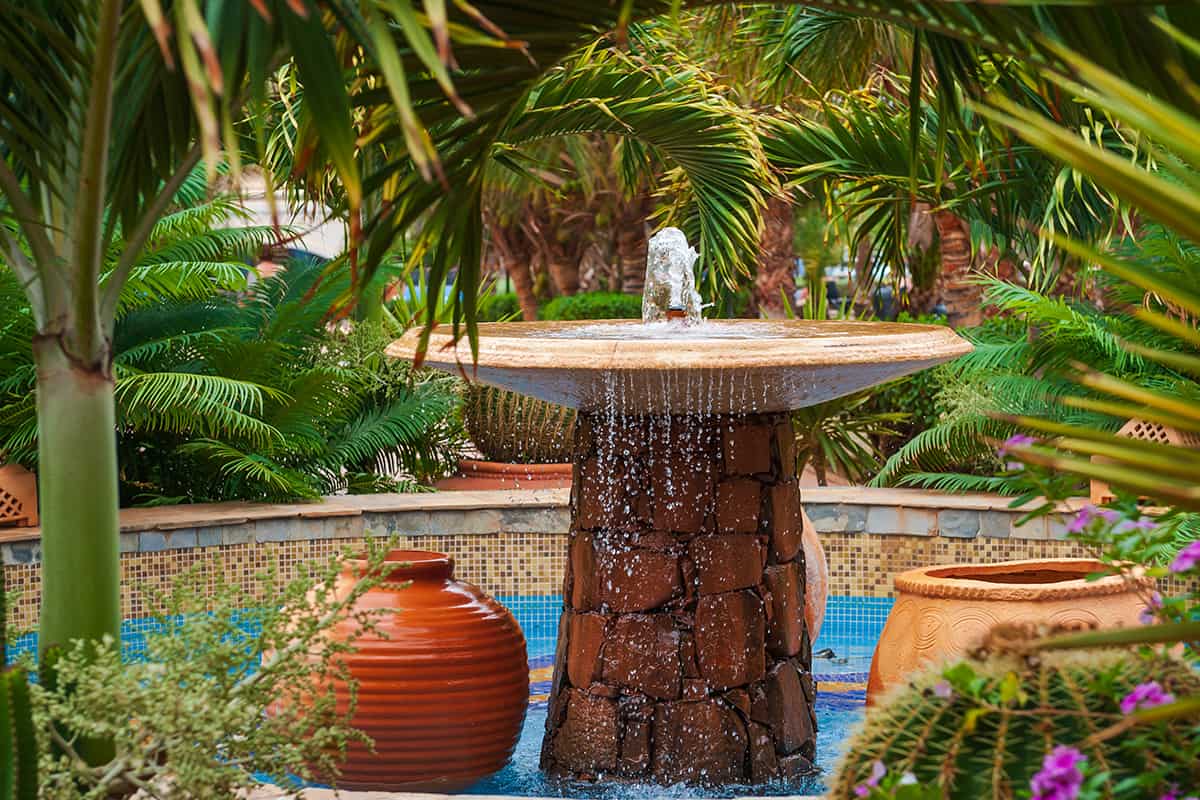
Maintaining a garden fountain is very crucial. You must ensure that your garden fountain is clean and does not attract parasites and nasty insects like mosquitoes.
Depending on the size of your garden fountain, you could have a cleaning schedule. However, if you don't have the time or desire to do it yourself, engage the services of a professional. Cleaning a garden fountain is straightforward and lets you spend some time outdoors.
Use the following maintenance tips to get the most out of your garden fountain.
Regular Pump Cleaning
The water pump must be kept clean if you don't want all sorts of scum breeding in your birdbath. Moreover, dead debris, such as leaves and twigs, might tamper with the pump's work. Thus, ensure that you take the pump out every three months and clean it according to the user manual instructions.
Algae Accumulation
Mosquitoes feed on algae, and an overgrown garden fountain is a bed and breakfast for the larvae. Therefore, free your fountain of algae with approved algae remover. You should consult a specialist on which product to use so as not to kill other inhabitants of your garden fountain (if any).
Completely Submerged Pump
A fountain water pump must stay completely submerged to work correctly. Once exposed, it will not keep the garden fountain water surface broken to deter mosquitoes from laying eggs or keep larvae from hatching. The water levels might deplete at different rates during the seasons, so keep an eye on the fountain's water level.
Wiping The Bowl
Garden fountains are ceramic, marble, or stone. Each of these materials requires proper attention and different cleaning methods. But the principle is one, drain the bowl and wipe the bowl with a soft cloth or brush. Remember not to use harsh or abrasive cleaning agents, which can perforate the fountain bowl or scratch it.
Changing Fountain Water
You might take it for granted that fountain water evaporates. Even though this is true, recycling the same water again and again will let it get murky. That's why you should change the fountain water at least once a month by draining the water and putting in a fresh one. You will equally flush out any larvae in the fountain system too.
How To Identify Mosquito Larvae In Your Garden Fountain
The fact that you have a small garden fountain doesn't mean mosquitoes won't want to lay eggs in it, especially if the water is stagnant. If you aren't familiar with what mosquito larvae look like, then here's what you should look out for:
- A film on the water surface usually houses the mosquito eggs.
- Hatched eggs turned into wiggly worm-like creatures on the water's surface, called wrigglers.
The larvae require seven to fourteen days without disturbance to hatch. They feed on any plant material in the water. That's why it's paramount to ensure the water surface of the fountain is broken continuously. And you won't get in contact with mosquito-borne diseases such as Dengue, malaria, or Zika virus in your backyard.
Can You Use Chlorine In Your Garden Fountain?
Some homeowners might want to use water with chlorine for their garden fountains as a protective measure not to attract mosquitoes since it is used in pool water. However, this is not a good idea, and neither is using bleach in your garden fountain.
Besides the bleach and chlorine being dangerous to fish, birds, frogs, and insects, they can also harm the fountain surface. It scratches the surface of marble and ceramic fountains.
To Sum It Up
Garden fountains do not attract mosquitoes if well maintained and not neglected. You should ensure that the water surface in the fountain is broken to make it impossible for mosquito larvae to incubate and hatch. Ensuring that you follow all the recommended maintenance measures, garden fountains, and other water features for your landscaping ideas will be a joy.
Here are more informative posts for your perusal:
What To Do With An Unwanted Pond? [7 Awesome Ideas!]


